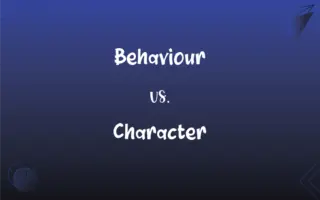Farewell vs. Adieu: What's the Difference?
By Harlon Moss & Aimie Carlson || Updated on May 28, 2024
Farewell is an English term used to say goodbye, often implying a longer separation, while adieu is a French term also used in English, conveying a final goodbye with a sense of permanence.

Key Differences
Farewell is a traditional English word used to express goodbye. It often carries a formal tone and suggests that the parting might be for a long time or possibly forever. The word combines "fare" (to get along) and "well," implying a wish for the person's well-being in their journey. Adieu, borrowed from French, is used similarly in English to express a more profound or final goodbye. It comes from the phrase "à Dieu," meaning "to God," indicating a departure with no expectation of reunion, thus adding a sense of finality to the farewell.
While farewell can be used in various contexts, including casual ones, it retains a formal and somewhat old-fashioned tone. It might be used in literature, ceremonies, or formal speech, suggesting a respectful and sincere goodbye. On the other hand, adieu is less commonly used in everyday English but appears more in literary contexts or formal farewells. It adds an element of sophistication and emotional weight, often found in poetry, classical literature, or dramatic expressions of parting.
Farewell has variants like "fare thee well" or "farewell party," which are part of modern and historical usage in English-speaking cultures. These variants maintain the original sentiment of wishing someone well as they depart. Adieu does not have as many variants in English but is sometimes used in idiomatic expressions like "bid adieu," maintaining its French origin's solemnity and finality. It’s more likely to be used in contexts where the French influence is acknowledged or appreciated.
Comparison Chart
Language Origin
English
French
Tone/Formality
Formal, traditional
Formal, literary
ADVERTISEMENT
Usage Context
Ceremonial, respectful partings
Literary, poetic, final goodbyes
Variants
Fare thee well, farewell party
Bid adieu
Emotional Weight
Sincere, respectful
Profound, final
Farewell and Adieu Definitions
Farewell
Parting words or actions.
Their farewell hug lasted longer than usual.
Adieu
A formal or literary goodbye.
The poet penned an adieu to his lost love.
ADVERTISEMENT
Farewell
Wishing someone well upon departure.
We held a farewell party for our colleague.
Adieu
Used to express a profound departure.
The character's last words were a dramatic adieu.
Farewell
Used to express good wishes when parting.
She waved farewell as the train departed.
Adieu
A goodbye, often final.
He whispered a sad adieu as he left.
Farewell
A formal goodbye.
He gave a heartfelt farewell speech at his retirement.
Adieu
Farewell with an implication of no return.
She bid adieu to her childhood home.
Farewell
Used to express goodbye.
Adieu
From the French "to God," indicating finality.
They parted ways with a solemn adieu.
Farewell
An acknowledgment at parting; a goodbye.
Adieu
Used to express farewell.
Farewell
The act of departing or taking leave.
Adieu
A farewell.
Farewell
A wish of happiness or safety at parting, especially a permanent departure
Adieu
Said to wish a final farewell; goodbye.
Farewell
A departure; the act of leaving
Adieu
A farewell, a goodbye; especially a fond farewell, or a lasting or permanent farewell.
We bid our final adieus to our family, then boarded the ship, bound for America.
Farewell
Parting, valedictory, final.
A farewell discourse;
The band's farewell tour
Adieu
Good-by; farewell; an expression of kind wishes at parting.
Farewell
Goodbye.
He said "Farewell!" and left.
Adieu
A farewell; commendation to the care of God at parting.
Farewell
To bid farewell or say goodbye.
Adieu
A farewell remark;
They said their good-byes
Farewell
Go well; good-by; adieu; - originally applied to a person departing, but by custom now applied both to those who depart and those who remain. It is often separated by the pronoun; as, fare you well; and is sometimes used as an expression of separation only; as, farewell the year; farewell, ye sweet groves; that is, I bid you farewell.
So farewell hope, and with hope, farewell fear.
Fare thee well! and if forever,Still forever fare thee well.
Farewell
A wish of happiness or welfare at parting; the parting compliment; a good-by; adieu.
Farewell
Act of departure; leave-taking; a last look at, or reference to something.
And takes her farewell of the glorious sun.
Before I take my farewell of the subject.
Farewell
Parting; valedictory; final; as, a farewell discourse; his farewell bow.
Leans in his spear to take his farewell view.
Farewell
An acknowledgment or expression of goodwill at parting
Farewell
The act of departing politely;
He disliked long farewells
He took his leave
Parting is such sweet sorrow
Farewell
Goodbye, indicating a long separation.
Farewell, my friend, until we meet again.
FAQs
What does 'farewell' mean?
Farewell is a formal way to say goodbye, often implying a long-term or final separation.
What is a 'farewell party'?
A farewell party is an event held to say goodbye to someone who is leaving a group or place.
Can 'farewell' be used in writing?
Absolutely, it is often found in literature, speeches, and formal communication.
Can 'farewell' be used in casual conversation?
Yes, but it is more commonly used in formal or respectful contexts.
How do you pronounce 'adieu'?
Adieu is pronounced as "uh-DOO" or "ah-DYOO."
Is 'adieu' used frequently in modern English?
No, it is less common and typically appears in literary or formal contexts.
Is 'farewell' still relevant today?
Yes, it is used in various contexts, though it may sound a bit old-fashioned.
What is an alternative to 'farewell'?
Alternatives include goodbye, so long, and see you later.
Where does the term 'adieu' come from?
Adieu is derived from the French phrase "à Dieu," meaning "to God," signifying a final goodbye.
Do 'farewell' and 'adieu' mean the same thing?
They both mean goodbye, but adieu carries a stronger sense of finality.
Can 'adieu' be used in everyday conversation?
It can be, but it is more suited to formal or poetic contexts.
Does 'adieu' have an emotional connotation?
Yes, it often conveys a deep sense of finality and emotional weight.
Is 'farewell' a noun or a verb?
It can be both; as a noun, it means a goodbye, and as a verb, it means to bid farewell.
What is the difference between 'farewell' and 'goodbye'?
Farewell is more formal and respectful, while goodbye is more common and casual.
Can 'farewell' be used in emails?
Yes, particularly in formal or business communication.
Is 'adieu' used in other languages?
Adieu is primarily French but has been adopted into English and other languages.
Are there songs with the word 'farewell'?
Yes, many songs feature the word farewell in their titles or lyrics.
Is 'adieu' used in modern literature?
Yes, it can still be found in contemporary literary works.
What is a 'farewell speech'?
A farewell speech is given to mark someone's departure and to wish them well.
Can you use 'adieu' in a sentence?
Yes, e.g., She said adieu to her friends before moving abroad.
About Author
Written by
Harlon MossHarlon is a seasoned quality moderator and accomplished content writer for Difference Wiki. An alumnus of the prestigious University of California, he earned his degree in Computer Science. Leveraging his academic background, Harlon brings a meticulous and informed perspective to his work, ensuring content accuracy and excellence.
Co-written by
Aimie CarlsonAimie Carlson, holding a master's degree in English literature, is a fervent English language enthusiast. She lends her writing talents to Difference Wiki, a prominent website that specializes in comparisons, offering readers insightful analyses that both captivate and inform.
































































